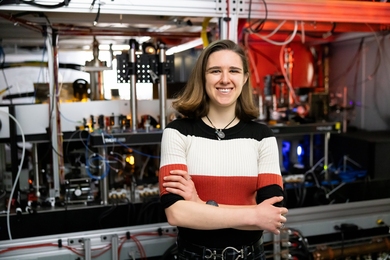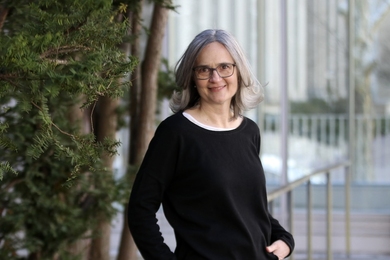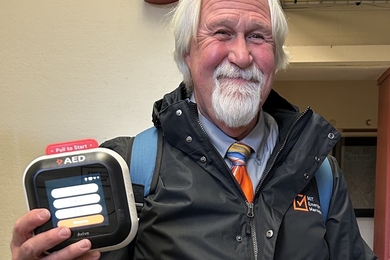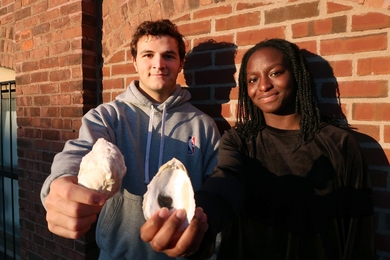Associate Dean for Alcohol Education and Policy Daniel Trujillo has been chosen as a Center Associate by the US Department of Education's Higher Education Center for Alcohol and Other Drug Prevention . Working as trainers, consultants and evaluators, Center Associates assist colleges and universities with their prevention efforts relating to alcohol and other drugs. They work with institutions similar in size and type to their own, and with those working on particular issues in which the they have expertise.
Assistant Professor of History Joshua Sosin has been awarded a fellowship in ancient Greek studies at Harvard University's Center for Hellenic Studies for 2002-03. He will be working on a book titled "A Possession for All Time: Perpetual Endowments in the Ancient World."
Laurence R. Young, the Apollo Program Professor of Aeronautics and former director of the National Space Biomedical Research Institute (NSBRI), was recognized for his leadership of the organization during its formative years.
Young, who was named the NSBRI's inaugural director in 1997, will continue his role as a principal investigator on the NSBRI's neurovestibular adaptation team and will serve as senior advisor to the director of the NSBRI. Its projects address space health concerns such as bone loss, muscle weakening, cardiovascular changes, sleep disturbances, immunology and infection, balance and orientation, radiation exposure, neurobehavioral and psychosocial issues, and nutrition, physical fitness and rehabilitation.
Thomas J. Allen, the Howard W. Johnson Professor of Management at the Sloan School and a professor of engineering systems in the Engineering Systems Division , will be awarded the doctoris honoris causa by Ramon Llull University in Barcelona, Spain for his "exceptional merits in the field of management of technology and innovation." Allen, a Margaret MacVicar Faculty Fellow, will receive the honorary doctorate in early April.
Shoji Shiba, a visiting professor in the Leaders for Manufacturing Program, has been named an Academician of the International Academy of Quality (IAQ), a global organization that monitors quality-related issues across all industries. Only 50 people worldwide hold the title at any given time. He was chosen as Academician due to his extensive research on Total Quality Management, particularly in Japan, Hungary and the United States. Shiba won the Sloan Teaching Excellence Award last year.
Professor James G. Fujimoto of the Research Laboratory of Electronics (RLE) and the Department of Electrical Engineering and Computer Science shares a 2002 Rank Prize for Optoelectronics. Fujimoto, a principal investigator in RLE's Optics and Quantum Electronics Group, was recognized for his outstanding contributions to the science and application of optoelectronics, particularly for the invention and applications of optical coherence tomography. The technology involves high-resolution, high-speed, cross-sectional tomographic imaging that has been applied successfully to medical diagnostics, materials science and microscopy.
H. Robert Horvitz, professor of biology and a Howard Hughes Medical Institute investigator, is a co-winner of the first annual Wiley Prize in the Biomedical Sciences. He was selected for his seminal research on programmed cell death and the discovery that a genetic pathway accounts for the programmed cell death within an organism. The prize, which includes a $25,000 grant, was created by publisher John Wiley & Sons, Inc., to recognize contributions that have opened new fields of research or advanced novel concepts or their applications in a particular biomedical discipline.
A two-person debate team from MIT finished second at the North American Championship held at McGill University in early February. Philippe Larochelle, a junior in physics, and Shuman Ghosemajumder, a graduate student in management, were the only American team to make the semifinal round in a field that included Harvard, Yale, Princeton, Columbia and Dartmouth. In the final round, they lost in a controversial 5-4 judges' decision in which all three American judges plus one Canadian judge awarded first place to MIT, while the other five Canadian judges put the University of Toronto in first place.
MIT has consistently had one of the top-ranked debate teams in the United States in recent years. The Institute has qualified for the elimination rounds of the World Debating Championship, where Larochelle was the top US speaker. Overall, MIT has won more tournaments, and made more final rounds, than any other debate team in the US this year. "We're very pleased with our accomplishments, especially when you consider that we're a technically oriented school, while most of our opponents are majoring in subjects more closely related to debating," said EECS junior Patrick Nichols, vice president of the team.
Institute Professor Mario Molina has been named to the board of directors of the John D. and Catherine T. MacArthur Foundation. The organization makes grants of more than $180 million each year in the areas of global security and sustainability, human and community development, the MacArthur Fellows program and the general program. Molina shared the 1995 Nobel Prize in chemistry for his discovery that chlorofluorocarbons were depleting the ozone layer.
The MIT Model United Nations Society 's delegation to the Harvard National Model UN on Feb. 14-17 took two "best delegation" awards for chemical engineering sophomore Rachel Livingston and management junior Anita Mhaskar, who were in the United Nations Development Programme; and management senior Aziz Hassanali, who was in the International Monetary Fund. Honorable mentions also went to freshmen Richard-Duane Chambers in the Special Political and Decolonization Committee and Al-Hussein Dahya for GkChP, a committee reenacting the coup in the Soviet Union in 1989. Model UN is a simulation of the United Nations system; college students assume the roles of UN ambassadors and debate the current issues on the UN's agenda.
Professor John Hansman has been named a Fellow of the American Institute of Aeronautics and Astronautics . He is being honored for "outstanding technical education leadership contributions to flight safety, human-automation integration of aerospace systems and the advancement of air transportation." He was specifically cited for bringing engineering discipline and solutions to subjects that involve both pilots and air traffic controllers.
A version of this article appeared in MIT Tech Talk on February 27, 2002.






